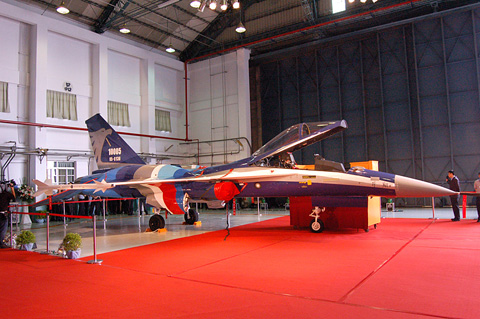The Ministry of National Defense yesterday dismissed media reports that it had halted plans to upgrade the Taiwan-made Indigenous Defense Fighter (IDF) warplanes at the request of the Cabinet to avoid undermining closer ties with Beijing.
Vice Minister of National Defense Lin Yu-pao (林於豹)aid at the legislature that both arms procurement from the US and the Hsiang Chan Project (翔展計畫) would proceed as scheduled.
The Hsiang Chan Project includes enhancing the IDF’s firepower, lengthening its range and providing it with the capability to attack Chinese radar control systems, runways, fuel depots and amphibious troops.

PHOTO: HSU SHAO-HSUAN, TAIPEI TIMES
Lin said the project was of tremendous importance to the nation’s defense industry and that there was a major discrepancy between media reports and reality.
The ministry said that the government’s position on the matter had not changed.
The ministry’s response came after the Chinese-language Liberty Times (the Taipei Times’ sister newspaper) quoted an unnamed military source as saying that the Cabinet had instructed the ministry to end the project next year.
The report said the Cabinet would still allocate next year’s NT$1 billion (US$32.8 million) budget for the Hsiang Chan Project, but that the Air Force should use the money for other purposes.
The report said that military officials were surprised by the Cabinet’s request, as in the past it would only ask the military to revise a budget and had never before canceled a project.
Military analysts were quoted as saying that the Cabinet could have made the decision to facilitate Taipei’s ongoing efforts to improve relations with Beijing.
Taiwan began to develop the IDF in 1980, when the US was unwilling to provide it with F-16s. Taiwan built 130 IDFs with the help of defense firm General Dynamics, which manufactures the F-16.
In 1992, Taiwan succeeded in ordering 150 F-16A/Bs from the US and 60 Mirage 2000-5s from France.
As the IDFs were more than 20 years old, and the Aerospace Industry Development Corp (AIDC) launched the NT$7 billion Hsiang Chan Project to upgrade the aircraft.
On March 29 last year, AIDC unveiled the first two upgraded IDFs to former president Chen Shui-bian (陳水扁).

INVESTIGATION: The case is the latest instance of a DPP figure being implicated in an espionage network accused of allegedly leaking information to Chinese intelligence Democratic Progressive Party (DPP) member Ho Jen-chieh (何仁傑) was detained and held incommunicado yesterday on suspicion of spying for China during his tenure as assistant to then-minister of foreign affairs Joseph Wu (吳釗燮). The Taipei District Prosecutors’ Office said Ho was implicated during its investigation into alleged spying activities by former Presidential Office consultant Wu Shang-yu (吳尚雨). Prosecutors said there is reason to believe Ho breached the National Security Act (國家安全法) by leaking classified Ministry of Foreign Affairs information to Chinese intelligence. Following interrogation, prosecutors petitioned the Taipei District Court to detain Ho, citing concerns over potential collusion or tampering of evidence. The

Seventy percent of middle and elementary schools now conduct English classes entirely in English, the Ministry of Education said, as it encourages schools nationwide to adopt this practice Minister of Education (MOE) Cheng Ying-yao (鄭英耀) is scheduled to present a report on the government’s bilingual education policy to the Legislative Yuan’s Education and Culture Committee today. The report would outline strategies aimed at expanding access to education, reducing regional disparities and improving talent cultivation. Implementation of bilingual education policies has varied across local governments, occasionally drawing public criticism. For example, some schools have required teachers of non-English subjects to pass English proficiency

‘FORM OF PROTEST’: The German Institute Taipei said it was ‘shocked’ to see Nazi symbolism used in connection with political aims as it condemned the incident Sung Chien-liang (宋建樑), who led efforts to recall Democratic Progressive Party (DPP) Legislator Lee Kun-cheng (李坤城), was released on bail of NT$80,000 yesterday amid an outcry over a Nazi armband he wore to questioning the night before. Sung arrived at the New Taipei City District Prosecutors’ Office for questioning in a recall petition forgery case on Tuesday night wearing a red armband bearing a swastika, carrying a copy of Adolf Hitler’s Mein Kampf and giving a Nazi salute. Sung left the building at 1:15am without the armband and apparently covering the book with a coat. This is a serious international scandal and Chinese

TRADE: The premier pledged safeguards on ‘Made in Taiwan’ labeling, anti-dumping measures and stricter export controls to strengthen its position in trade talks Products labeled “made in Taiwan” must be genuinely made in Taiwan, Premier Cho Jung-tai (卓榮泰) said yesterday, vowing to enforce strict safeguards against “origin laundering” and initiate anti-dumping investigations to prevent China dumping its products in Taiwan. Cho made the remarks in a discussion session with representatives from industries in Kaohsiung. In response to the US government’s recent announcement of “reciprocal” tariffs on its trading partners, President William Lai (賴清德) and Cho last week began a series of consultations with industry leaders nationwide to gather feedback and address concerns. Taiwanese and US officials held a videoconference on Friday evening to discuss the